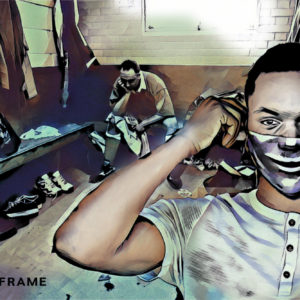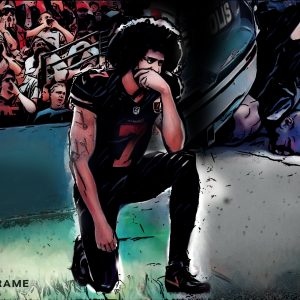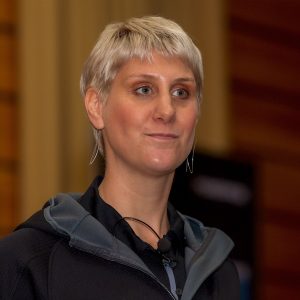Lenize Potgieter opens up about her depression
A few tough knocks left the Proteas netball player in need of a sabbatical. Now she’s sharing her mental health struggles, hoping it will encourage more elite athletes to talk about and normalise i…
Author:
18 January 2022

Lenize Potgieter, one of South Africa and the world’s best netball players, joined a timely sports conversation in 2021. Initiated by tennis star Naomi Osaka before four-time Olympic gold medallist gymnast Simone Biles weighed in, Potgieter brought the conversation closer to home.
Mental health in elite sport has become a much discussed topic internationally, but in South Africa there are still only a handful of athletes who have spoken openly about their struggles. Potgieter hopes that sharing her experience will begin to change that.
This was partly why she used social media to announce that she’d be taking a break from netball. Several factors led to her decision, but after being diagnosed with a major depressive disorder she made the call to stay home for the first time in seven years when the Proteas flew to Ireland to compete.
After a few months of rest and treatment, and with the benefit of hindsight, Potgieter couldn’t be happier with her decision and is now eager to chat about the tough months.
Related article:
“How it all started was, I was a little bit burnt out from netball, just training all the time and not being home, being in a foreign country, and all of these Covid things going on,” said the goal shooter who plays for the Adelaide Thunderbirds in Australia’s professional league.
Her flights were cancelled because of Covid and she joined the Thunderbirds a month late, giving her only a month to prepare for the new season. Having to quarantine also took its toll, along with jet lag and being in a different time zone.
“I was living alone in Australia … And when you’re alone you start overthinking things, and your thoughts just run haywire. They go all over the place. After that, I think I was just tired of netball. Then I came back to South Africa. I was in a relationship with someone for a year and a half and when I got back, I literally caught him in the act of cheating on me. With all that netball stress and burning out … that just broke me down.
“That night, I had the worst panic attack I’ve ever had … Any stress that I have, good or bad, I get a hole in my stomach and that prevents me from eating … I could see how I was losing weight and losing muscle. That was a very dark place for me to go to and that’s how I knew something was really wrong, after I lost 7kg in a few days. I was shocked when I saw how little I weighed and that’s where the fear came in.”
Feeling worse and worse
The 27-year-old had experienced fear and anxiety before, but never to this degree. “It was more just crying and feeling down, but not feeling like I needed to go to the hospital because I couldn’t breathe.”
Her decision to talk about her struggles publicly wasn’t an easy one, but she thought “maybe there’s someone out there who needs to hear it as well, that it’s okay not to be okay”. Two weeks after being diagnosed with depression, she posted about it on social media.
The response to that post has been overwhelming. “Everyone has been so loving and caring, and so supportive and encouraging … it’s been really great. My teammates, like Bongi [Msomi, national netball captain] and them, they all say they want me back and they miss me. But they also said we’re here for the whole journey and I need to take my time. So there’s no rush from their side, they just want to see me better.”
Related article:
People from all walks of life have messaged to say thank you for starting the conversation, that they’d been feeling this way but didn’t know how to deal with it. “Now they’re going to speak up about it, they’re going to get the help they need.
“That’s ultimately what I wanted to do. Yes, explain to people why I’m not with the Proteas, but also break the stigma of mental health issues. It’s not something to be ashamed of. It’s like any other injury, it’s just not physical. It’s mental and emotional, and we also need to recover from that.”
Being human
Potgieter says having athletes such as Osaka and Biles speak out has been a huge, positive step forward, but there’s plenty more that can be done to improve awareness, particularly in South Africa. “It’s definitely been a revolution … It makes it easier for other professionals to be like, okay, it is fine to feel this way. These super-famous people also feel this way, so I also need to get the courage to talk about it … It’s not all sunshine and roses, and it’s part of being human.”
Having played in England, New Zealand and Australia as well as at home, Potgieter says attitudes are different in South Africa. “The African continent, we are these brave people. We are proud and we don’t like to show weakness because we’re just those types of people.”
She says being honest and working through one’s feelings actually makes one stronger, “even if it’s not through the stereotypes that people have of us … I think it’s important for South Africans, especially elite sportspeople, to open up and show we can be vulnerable but still be brave.”
Related article:
Sports psychologist Kirsten van Heerden agrees. “Globally, there is a growing awareness of the importance of mental health. And with more athletes such as Naomi Osaka, Michael Phelps and Simone Biles talking about it, it has made it more acceptable for others to speak up. In SA, there are also some changes, but there is definitely still a stigma associated with mental health issues, and the culture within SA sport is still a bit of a macho one.”
Van Heerden says mental toughness and mental health get confused. “In South Africa, we have made some good strides in acknowledging the mental side of sport … but the next step is to acknowledge the mental side of the athlete themselves. Seeing a sports psychologist is becoming more acceptable for mental skills training, but there is still a wariness when it comes to talking about issues such as depression or anxiety.”
A psychologist on the team
National team structures can do more to support athletes, says Potgieter. Sports institutions and organisations don’t know what to do when an athlete says they’re not feeling their best and need help to sort it out. We need a starting point, she says, and that could be sportspeople opening up about their issues so they can be attended to immediately, “instead of waiting seven years and only doing it when the damage has already been done. It’s important to get the structures in place and help before it gets too hard.
“We need to educate ourselves more. If people opened up more, then that’s going to help improve the support structures. If all the national teams can start having a psychologist with them, or a mental health officer, that would already be a great starting point.”
Potgieter is in a much better place after regular treatment and a concerted effort on her own part. “I’ve been seeing a psychologist every week … and I also started seeing a psychiatrist, just for the fact that she can check my medication and give me meds that work for me. I’ve also been listening to my body and my mind.”
She has been spending time with her supportive family in Polokwane, training to maintain her fitness level, but doing nothing netball-related just yet.
“I’ve been given everything I need, so now I need to make the effort to get better … You need to make it happen. I’ve also been doing a lot of meditation and mindfulness sessions. Recently, I’ve been training every day, doing two sessions a day, doing puzzles and colouring, yoga and painting. And I have been catching up with a lot of my friends who I haven’t seen in years.”
Related article:
Hesitant to plan too far ahead, Potgieter hopes to return to Australia at the end of January to begin pre-season training with the Thunderbirds for the Suncorp Super Netball domestic league. She then aims to rejoin the Proteas for the Commonwealth Games in Birmingham, England, which start at the end of July.
“I really, really with all my heart want to go to the Commonwealth Games, because that is something you work towards. It only happens every four years and I missed the previous one due to an ankle injury.”
A self-proclaimed work in progress, but willing to do the work and already feeling better equipped for the future, Potgieter’s advice to others in a similar situation is simple: “Don’t be afraid to speak out. Don’t feel ashamed that you are feeling this way, because you are allowed to feel your feelings.
“That is the way God created you, and you are allowed to go and speak to anyone that can give you help. Never feel ashamed of who you are. You are always enough and there are people that want to support you. They just need to know that you need the support, so be honest about how you’re feeling and make the effort to get better.
“If I can help one person to not feel the way that I felt – because I wouldn’t wish that on anybody, not on my worst enemy – then I’m happy. I feel good.”




